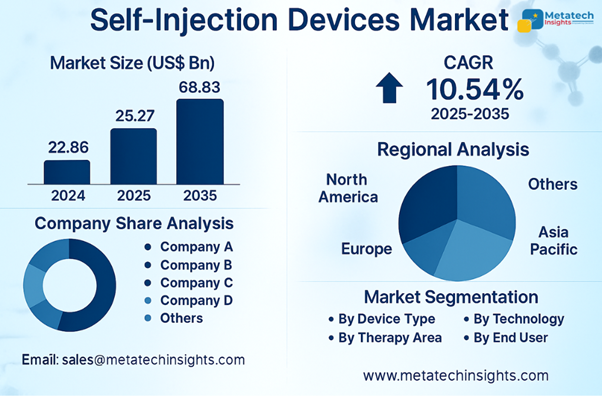Global Self-Injection Devices Market to Hit USD 68.83 Bn by 2035 | CAGR 10.54%
09 Aug 2025 | Report ID: MI2796 | Industry: Medical Devices | Pages: 217 | Forecast Year: 2025-2035

Read more about this report- Global Self-Injection Devices Market to Hit USD 68.83 Bn by 2035 | CAGR 10.54%
The Self-Injection Devices Market is valued at USD 22.86 billion in 2024 and is projected to reach USD 68.83 billion by 2035, growing at a CAGR of 10.54% from 2025 to 2035.
A major growth driver is the increasing prevalence of chronic conditions like diabetes and autoimmune disorders, which necessitate frequent drug administration, while a key restraint is patient hesitation and poor adherence due to needle phobia and self-use anxiety. The emergence of smart injectors with dose tracking and connectivity features presents a significant opportunity to boost patient compliance and enable remote monitoring.
The market is segmented by Device Type (Prefilled Syringes, Auto-injectors, Pen Injectors), Therapy Area (Diabetes, Rheumatoid Arthritis, Multiple Sclerosis, Anaphylaxis, Oncology), Technology (Manual, Semi-automatic, Fully Automatic), and End User (Home Care, Hospitals, Clinics). Among these, the Auto-injector segment is gaining strong momentum due to its user-friendly design, enhanced safety mechanisms, and increasing use in emergency therapies like anaphylaxis.
Key application areas include chronic disease management, emergency treatments, hormonal therapies, and vaccination. Notably, in diabetes care, self-injection devices have advanced with smart insulin pens offering real-time dose logging and app-based glucose integration, thus streamlining at-home management and reducing hospital dependency.
Market expansion is also supported by reimbursement policies, direct-to-consumer medical technologies, and growing digital health ecosystems. In Germany, the statutory health insurance system provides strong reimbursement for self-injection devices used in chronic disease therapy, fostering adoption among the elderly and outpatient populations.
The five major regions contributing to this market include North America, Europe, Asia Pacific, Latin America, and the Middle East & Africa. In South Korea, growing demand for personalized medicine and high mobile health penetration are driving the adoption of connected self-injection solutions.
Leading players in the market include BD (Becton, Dickinson and Company), Ypsomed Holding AG, Gerresheimer AG, Eli Lilly and Company, and SHL Medical. These companies are shaping the market by developing connected, ergonomic, and patient-centric devices, investing in AI-integrated delivery platforms, and expanding access through strategic partnerships with pharma companies for biologic drug delivery.
Maximize your value and knowledge with our 5 Reports-in-1 Bundle - over 40% off!
Our analysts are ready to help you immediately.
